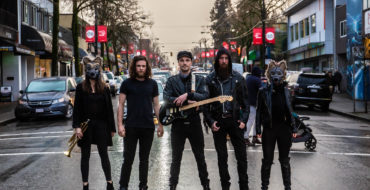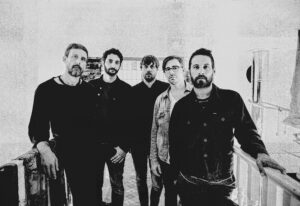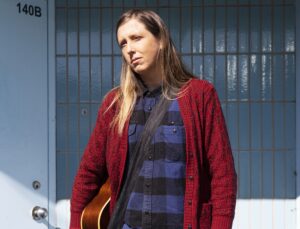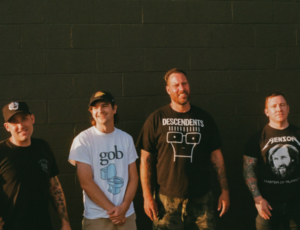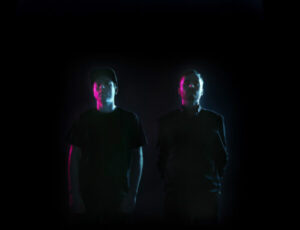Like everyone on the planet right now, Tom Van Deursen had big plans for 2020. But even before COVID-19 shut the live music scene down, Van Deursen’s best laid plans ran into problems: differences of opinion, public pressure, and harassment led to a string of cancelled dates in the Prairies for his band Small Town Artillery. What happened? Where did 2020 begin to go wrong? And when it is safe to tour again, will these issues flare up again?
As vocalist-guitarist for the band Small Town Artillery, Van Deursen has twenty years experience playing and making music. Most of that time with this brother, Derek (drummer-vocalist in STA). A productive group, STA has released two LPs and a slew of singles since 2017, and just released the EP Bright Side Bandits in March. Joining the Van Deursen brothers in STA are Carson Webber (bass), Alex Maher (saxophone) and Phil Austrom (Trumpet). (Listen and watch the lead single, “Day As An Arrow” here.)

The tour they planned was to be the most ambitious of their career: a cross country tour that focused on smaller towns: Camrose, Swan River, Kenora, Dryden, and Corbyville, etc.
“We’re from Kaslo,” Van Deursen says. “We find (small town gigs) are the best shows. I like learning about each community and understanding what makes it tick and what troubles it’s facing. So I wanted to skip major cities and try our luck in smaller centres.”
Working as an in-house booking agent, Tom spent five months cold calling venues throughout the country. By January, STA had confirmed 42 shows from Victoria to Halifax, including several dates throughout Alberta and Saskatchewan.
Trouble emerged in the Prairies, however, after the band posted a message of solidarity with the land defenders of the Wet’suwet’en people. The Norman Richie Community hall in Kindersley, Saskatchewan got the proverbial ball rolling. The band was told that someone had informed the hall that STA had messages in some of their videos that could be construed as anti-pipeline, and that some locals, many of whom work in the oil and gas sector, would not take kindly to that.
“We had a conference call with the members of the (Kindersley Community) board, and they weighed in one at a time with their concerns. Everybody was really friendly. One guy even said, “You realize you don’t have a very fossil fuel-friendly routing,” and the whole table exploded in laughter. I laughed too, because we’re in that in-between zone where we rely so heavily on the energy industry, and it makes so many of our dreams and so much of our life possible.
The band reached an agreement with the Kindersley Community folks to keep the politics out of the show and just play some music. It seemed the problem had been resolved. Diplomacy aside, I asked Van Deursen if this controversy would change his approach to songwriting, he was emphatic: “I am not going to stop writing about things I believe in.”
“I have been vocal about my resistance to development projects especially when they go against human rights and First Nation Indigenous rights,” Van Deursen says.
Over the next week, folks in and around Kindersley caught wind of the story, and started directing their ire at the band online.
The harassment campaign went into full, and very public, swing. “People began pushing back,” Van Deursen says, “because we had supported the Wet’suwet’en protests here in BC.”
“We touched a nerve,” he says. “It snowballed on Facebook, and the community group was getting angry letters, and the band started to receive all of this negative messaging—and lots of positive messaging, too, but a lot of flack.
Before long, the mayor of Kinderlsey advised the Norman Richie Community Hall to drop the band, and they did. The band conceded with the decision because, Van Deursen says, “we didn’t want any trouble … we pulled that show and released a statement saying we never meant to attack hard working people in that industry. It was more about a human rights issue in BC … it got to the point where five shows in Alberta and Saskatchewan got cancelled from this online kickback to the band.”
“We learned a lot,” he continues,”about what people are up against in the Prairies, and it was breaking my heart. I wanted to go there through the vessel of music … and just have open conversations with people. Music … is about bringing people together: you dance, sweat, it’s therapeutic, and then afterwards you get to sit down and have a beer and talk to each other. And I found for the first time that it was impossible to have conversations with total strangers who decided to dislike us based on a few of our social views.”
Losing five gigs in a week was a blow, but even then the band was committed to carrying on. “In the last 12 years, I’ve always had one or fifty confirmed dates ahead of me,” Van Deursen says. Life without a gig to look forward to was not something he or the band relished.
Enter COVID-19, the game changer of all game changers. As the band reconciled how to navigate a cross-country tour with a sudden gap of dates in the middle, COVID-19 reared its ugly head. Venues cancelled or postponed dates before everyone in Canada was told to stay home. The tour was toast.
For now, Van Deursen is living on Pender Island, cutting logs, and sleeping in his RV, The Millenium Falcon. He hasn’t done much songwriting, though. “I’m on pause right now,” Van Deursen says. Although he did write one new song, reflecting on COVID-19. “It’s a good slowdown for me because I have been running after the music dream for ten years, full steam ahead, and never giving myself a break. So, here’s the break, man. I’m taking it.”


